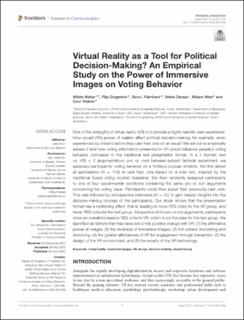Bitte benutzen Sie diese Kennung, um auf die Ressource zu verweisen:
https://doi.org/10.21256/zhaw-25182| Publikationstyp: | Beitrag in wissenschaftlicher Zeitschrift |
| Art der Begutachtung: | Peer review (Publikation) |
| Titel: | Virtual reality as a tool for political decision-making? : an empirical study on the power of immersive images on voting behavior |
| Autor/-in: | Weber, Wibke Dingerkus, Filip Fabrikant, Sara Zampa, Marta West, Mirjam Yildirim, Onur |
| et. al: | No |
| DOI: | 10.3389/fcomm.2022.842186 10.21256/zhaw-25182 |
| Erschienen in: | Frontiers in Communication |
| Band(Heft): | 7 |
| Heft: | 842186 |
| Erscheinungsdatum: | 23-Jun-2022 |
| Verlag / Hrsg. Institution: | Frontiers Research Foundation |
| ISSN: | 2297-900X |
| Sprache: | Englisch |
| Schlagwörter: | Virtual reality; Immersive image; VR design; Decision-making; Visual framing |
| Fachgebiet (DDC): | 006: Spezielle Computerverfahren 320: Politik |
| Zusammenfassung: | One of the strengths of virtual reality (VR) is to provide a highly realistic user experience. How would VR’s power of realism affect political decision-making, for example, when experienced by citizens before they cast their vote on an issue? We set out to empirically assess if and how voting information presented in VR would influence people’s voting behavior, compared to the traditional text presentation format. In a 2 (format: text vs. VR) × 2 (argumentation: pro vs. con) between-subject factorial experiment, we assessed participants’ voting behavior on a fictitious popular initiative. We first asked all participants (N = 179) to cast their vote based on a brief text, inspired by the traditional Swiss voting booklet (baseline). We then randomly assigned participants to one of four experimental conditions containing the same pro or con arguments concerning the voting issue. Participants could then adjust their previously-cast vote. This was followed by retrospective interviews (N = 32) to gain deeper insights into the decision-making process of the participants. Our study shows that the presentation format has a reinforcing effect, that is, leading to more YES votes for the VR group, and fewer YES votes for the text group. Irrespective of the pro or con arguments, participants show an overall increase in YES votes in VR, which is not the case for the text group. We identified six factors that may have led to this positive change with VR: (1) the affirmative power of images, (2) the vividness of immersive images, (3) first-person storytelling and storyliving, (4) the greater affordances of VR for engagement through interaction, (5) the design of the VR environment, and (6) the novelty of the VR technology. |
| URI: | https://digitalcollection.zhaw.ch/handle/11475/25182 |
| Volltext Version: | Publizierte Version |
| Lizenz (gemäss Verlagsvertrag): | CC BY 4.0: Namensnennung 4.0 International |
| Departement: | Angewandte Linguistik |
| Organisationseinheit: | Institut für Angewandte Medienwissenschaft (IAM) |
| Enthalten in den Sammlungen: | Publikationen Angewandte Linguistik |
Dateien zu dieser Ressource:
| Datei | Beschreibung | Größe | Format | |
|---|---|---|---|---|
| 2022_Weber-etal_VR-for-political-decision-making.pdf | 1.62 MB | Adobe PDF |  Öffnen/Anzeigen |
Zur Langanzeige
Weber, W., Dingerkus, F., Fabrikant, S., Zampa, M., West, M., & Yildirim, O. (2022). Virtual reality as a tool for political decision-making? : an empirical study on the power of immersive images on voting behavior. Frontiers in Communication, 7(842186). https://doi.org/10.3389/fcomm.2022.842186
Weber, W. et al. (2022) ‘Virtual reality as a tool for political decision-making? : an empirical study on the power of immersive images on voting behavior’, Frontiers in Communication, 7(842186). Available at: https://doi.org/10.3389/fcomm.2022.842186.
W. Weber, F. Dingerkus, S. Fabrikant, M. Zampa, M. West, and O. Yildirim, “Virtual reality as a tool for political decision-making? : an empirical study on the power of immersive images on voting behavior,” Frontiers in Communication, vol. 7, no. 842186, Jun. 2022, doi: 10.3389/fcomm.2022.842186.
WEBER, Wibke, Filip DINGERKUS, Sara FABRIKANT, Marta ZAMPA, Mirjam WEST und Onur YILDIRIM, 2022. Virtual reality as a tool for political decision-making? : an empirical study on the power of immersive images on voting behavior. Frontiers in Communication. 23 Juni 2022. Bd. 7, Nr. 842186. DOI 10.3389/fcomm.2022.842186
Weber, Wibke, Filip Dingerkus, Sara Fabrikant, Marta Zampa, Mirjam West, and Onur Yildirim. 2022. “Virtual Reality as a Tool for Political Decision-Making? : An Empirical Study on the Power of Immersive Images on Voting Behavior.” Frontiers in Communication 7 (842186). https://doi.org/10.3389/fcomm.2022.842186.
Weber, Wibke, et al. “Virtual Reality as a Tool for Political Decision-Making? : An Empirical Study on the Power of Immersive Images on Voting Behavior.” Frontiers in Communication, vol. 7, no. 842186, June 2022, https://doi.org/10.3389/fcomm.2022.842186.
Alle Ressourcen in diesem Repository sind urheberrechtlich geschützt, soweit nicht anderweitig angezeigt.